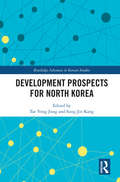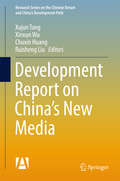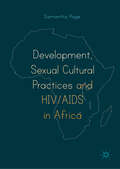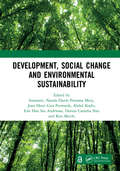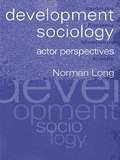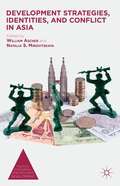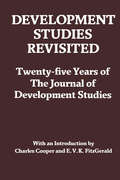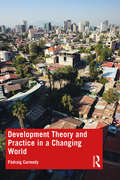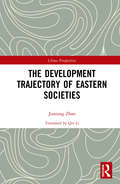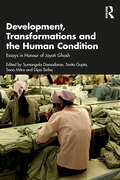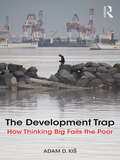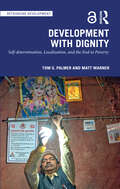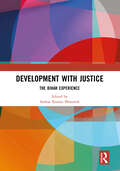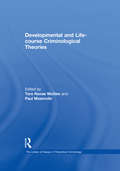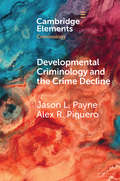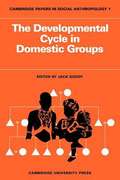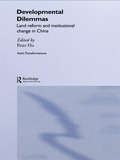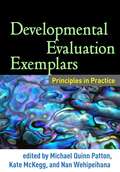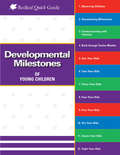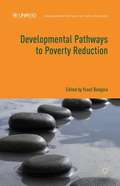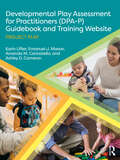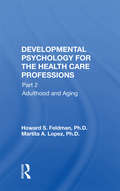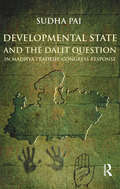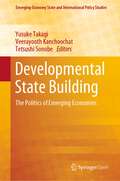- Table View
- List View
Development Prospects for North Korea (Routledge Advances in Korean Studies)
by Tae Yong Jung Sung Jin KangThe contributors to this book explore the current situation of North Korea in various aspects and provide policy suggestions for North Korea to become part of the international community and achieve sustainable development. Focusing on three key areas of economic development, namely, international sectors, agriculture and urban development, and energy and environment, this book lays out recommendations and prospects for North Korea. Authors assess the current situation of North Korea, explore preconditions for becoming a member of the international community, and suggest policies necessary for the sustainable development of North Korea. They cover a wide range of areas including reforestation, WTO accession, and the potential for economic integration with South Korea. These evaluations draw on both what is understood about the current situation in North Korea and comparisons with other countries and territories. This book will be a valuable resource for scholars and policy planners who focus on North Korea.
Development Report on China’s New Media
by Xujun Tang Xinxun Wu Chuxin Huang Ruisheng LiuIn this book, specialists and scholars present a comprehensive account of the latest developments in Chinese new media. The articles explore important areas such as security of cyberspace in China; the development of WeChat and micro-blogs; public opinions of social media and the transformation of traditional media. It also summarizes the development of the new-media industry, including digital TV, mobile games, the online video industry, IPTV, new-media advertising and mobile news applications. It is a valuable reference work for researchers and professionals working in media.
Development, Sexual Cultural Practices and HIV/AIDS in Africa
by Samantha PageThis open access book introduces the theoretical frameworks and academic debates concerning sexual cultural practices and HIV/AIDS in Africa. It shows how these frameworks have been applied in a practical sense in Africa to investigate sexual cultural practices and their link with HIV/AIDS. The author provides an overview of both the field of study and the methods used during fieldwork. Finally, it assesses the implications of the findings for the conceptualization and provision of current and future HIV/AIDS policies and programs in Africa. This monograph will appeal to policy makers and practitioners working in the field of HIV/AIDS in the Global South as well as academics and students.
Development, Social Change and Environmental Sustainability: Proceedings of the International Conference on Contemporary Sociology and Educational Transformation (ICCSET 2020), Malang, Indonesia, 23 September 2020
by SumarmiNowadays, the concept of SDGs (Sustainable Development Goals) is starting to replace the concept of MDGs (Millennium Developmental Goals). It is a global goal adopted by all United Nations member states. It emphasizes the idea that the development of every country can only be achieved by balancing other factors such as social, economic, and environmental sustainability. It is already clear how sustainable development works with environmental ethics and management. However, there are still issues regarding the sustainable development and human well-being. Sustainable development should focus on finding a way for society to meet their present needs for the long term without sacrificing the ability of future generations to meet their needs. This international seminar provides research results and literature regarding the topic of sustainable development concept, the dynamics of sustainable development and social change, and environmental sustainability. The international seminar, entitled 1st International Conference on Contemporary Sociology and Educational Transformation, listed speakers from several countries providing an overview on human and environmental resilience. This book contains a selection of papers presented at the conference.
Development Sociology: Actor Perspectives
by Norman LongIn this exciting and challenging work, Norman Long brings together years of work and thought in development studies to provide a key text for guiding future development research and practice. Using case studies and empirical material from Africa and Latin America, Development Sociology focuses on the theoretical and methodological foundations of an actor-oriented and social constructionist form of analysis. This style of analysis is opposed to the traditional structuralist/institutional analysis which is often applied in development studies. With an accessible mix of general debate, critical literature reviews and original case study materials this work covers a variety of key development issues. Among many important topics discussed, the author looks at commoditisation, small-scale enterprise and social capital, knowledge interfaces, networks and power, globalisation and localisation as well as policy formulation and planned intervention processes. This book should be read for its desire to pursue a form of analysis that helps us to understand better (and more realistically) the kinds of development interventions and social transformations that have characterised the second half of the twentieth century and will no doubt continue to characterise future development studies.
Development Strategies, Identities, and Conflict in Asia
by William Ascher Natalia MirovitskayaDevelopment Strategies, Identities, and Conflict in Asia explores the links between Asian governments' development strategies and the nature and dynamics of inter-group violence, analyzing variations in strategies and their impacts through broad comparative analyses, as well as case studies focused on eight countries.
Development Studies Revisited: Twenty-five Years of the "Journal of Development Studies"
by Charles Cooper E. V. FitzGeraldFirst published in 1989. The Journal of Development Studies was founded 25 years ago as a professional journal for what had by then become an established sub-discipline within British social science. The Journal has consistently published a broad spectrum of British research on development studies - a catholicity that has been reflected in the composition of the Editorial Board over the years - and has always welcomed authors from the USA, the European Continent, and above all from the Third World. Collated form the last twenty-five years of the journal presented here are a collection of 20-odd papers that represent less than three per cent of articles published since 1964.
Development Theory and Practice in a Changing World
by Pádraig CarmodyTaking a critical and historical view, this text explores the theory and changing practice of international development. It provides an overview of how the field has evolved and the concrete impacts of this on the ground on the lives of people in the Global South. Development Theory and Practice in a Changing World covers the major theories of development, such as modernisation and dependency, in addition to anti-development theories such as post-modernism and decoloniality. It examines the changing nature of immanent (structural) conditions of development in addition to the main attempts to steer them (imminent development). The book suggests that the era of development as a hegemonic idea and practice may be coming to an end, at the same time as it appears to have achieved its apogee in the Sustainable Development Goals as a result of the rise of ultra-nationalism around the world, the increasing importance of securitisation and the existential threat posed by climate change. Whether development can or should survive as a concept is interrogated in the book. This book offers a fresh and updated take on the past 60 years of development and is essential reading for advanced undergraduate students in areas of development, geography, international studies, political science, economics and sociology.
The Development Trajectory of Eastern Societies (China Perspectives)
by Zhao JiaxiangIn the four volumes of The Development Trajectory of Eastern Societies and the Theories and Practices of Socialism, the author re-examines Marx and Engels’ theories on the development trajectory of Eastern societies by integrating theoretical analysis of Marxist theories and a historical investigation of socialist revolution and socialist construction around the world. Pointing out the guiding significance of five aspects of the basic principles of Marxism for studying how Eastern societies develop, this volume interrogates various assumptions that have prevailed in academia, addresses unexplained topics, and offers insight into the understanding of these basic principles. The result is a penetrating and specific understanding of Marxist basic principles and the development trajectory of Eastern societies. Critical engagement with predominant understandings and a refreshing reformulation of Marxist theoretical bases make the book a key new reference for readers who are studying or are interested in Marxism, Marxist philosophy, and the history of philosophy.
Development, Transformations and the Human Condition: Essays in Honour of Jayati Ghosh
by Sumangala Damodaran Smita Gupta Sona Mitra Dipa SinhaThe world is grappling to come up with alternative imaginations for transformation despite repeated crises, inequalities and immiseration caused by the increasing dominance of the neo-liberal capitalist framework and the collapse of twentieth-century socialist models. This book looks at concepts that form the core of development economics and political economy and brings together perspectives that explore the inextricable relationship between development and human rights, social movements and the call for social transformation.The essays in this volume honour the massive corpus of work across a large number of areas around development issues by the eminent economist Jayati Ghosh. The book includes contributions by academics, activists and practitioners and attempts to understand the socio-economic causes of inequality, poverty and oppression. Divided into five parts – corresponding broadly to key areas of Ghosh’s work – the book explores capitalism, inequality and development, gender and development, political economy of trade and financial systems, human development and human rights, and music. The volume situates Ghosh’s work within a heterodox and broad-based understanding of development processes and provides many insights towards a new vision that sets an agenda for further research as well as mobilisation.This volume will be of great interest to students, researchers, practitioners and scholars working on the issues of development, transformations, political economy, social science, economics, macroeconomics, international economics, politics and development studies.
The Development Trap: How Thinking Big Fails the Poor
by Adam D. KišA wave of optimism is sweeping through the international aid and development industry, championed by leaders such as Jeffrey Sachs and Jim Yong Kim, who believe that poverty eradication could be within our grasp. Yet in stark opposition come those who believe that all international development intervention is hegemonic, paternalistic, and neocolonialist and must be done away with. In this book, Adam D. Kiš argues for a middle ground. Poverty is an entrenched, intractable problem that will never be entirely eradicated. However, if we reorientate our objectives in line with realistic goals that improve the way that poverty is confronted on a smaller scale, we can still continue the fight for meaningful change. Using rigorous scholarship illustrated with vivid storytelling and personal anecdotes from fighting against poverty in the field, The Development Trap argues that we need to make progress against poverty on the micro, rather than the macro scale. Instead of shooting for a single overarching end of poverty, our goals must be modest and reachable. Poverty still won’t go away, on a macro scale, but it can go away for specific individuals - in fact, it already happens all the time. The Development Trap is a compelling account of the challenges of eradicating poverty, and the possibilities for meaningful change at a smaller scale. It will be perfect for international development professionals, students and scholars, and for those with a general interest in the future of aid and development.
Development with Dignity: Self-determination, Localization, and the End to Poverty (Rethinking Development)
by Tom G. Palmer Matt WarnerAt a time when the global development industry is under more pressure than ever before, this book argues that an end to poverty can only be achieved by prioritizing human dignity. Unable to adequately account for the roles of culture, context, and local institutions, today’s outsider-led development interventions continue to leave a trail of unintended consequences, ranging from wasteful to even harmful. This book shows that increased prosperity can only be achieved when people are valued as self-governing agents. Social orders that recognize autonomy and human dignity unleash enormous productive energy. This in turn leads to the mobilization of knowledge-sharing that is critical to innovation and localized problem-solving. Offering a wide range of interdisciplinary perspectives and specific examples from the field showing these ideas in action, this book provides NGOs, multilateral institutions, and donor countries with practical guidelines for implementing "dignity-first" development. Compelling and engaging, with a wide range of recommendations for reforming development practice and supporting liberal democracy, this book will be an essential read for students and practitioners of international development.
Development with Justice: The Bihar Experience
by Sankar Kumar BhaumikSince the nation’s independence, the union and state governments of India have employed a variety of development strategies, some of which have evolved over time. The model of development implemented in Bihar in recent decades is different from its prior development strategies. Along with a number of social reform initiatives, the Bihar government implemented the “development-with-justice” model to enhance the lives and living circumstances of the most marginalized groups of the population and ensure the attainment of social justice.In light of the aforementioned context, this book offers an understanding of the various aspects of the Bihar government’s “development-with-justice” model, and the effects of its implementation on lives and quality of living conditions of the state’s underprivileged population. The book covers a wide spectrum of areas such as history of social reform measures, social justice in education, health, labour market, etc., caste- and gender-based discrimination, women’s empowerment, migrant workers, poverty, inequality, agrarian concerns, planning for development, and so on. Besides recommending policies to improve the state’s development outcomes, this book will aid researchers in identifying topics that may require additional research. Clearly researched, concise, and up-to-date, this book will be useful to the students and researchers from the fields of development economics, development studies, gender studies, sociology, political science, economic history, as well as the policy-planners in the government.
Developmental and Life-course Criminological Theories
by Paul MazerolleThe developmental and life-course perspective in criminology came to prominence during the late 1980s and throughout the 1990s a number of theories were developed to explain offending behavior over the life-course. This volume brings together theoretical statements, empirical tests and debates of these major theories within the developmental and life-course criminology perspective. In the first section of the book, original theoretical statements are provided and this is followed by a section which includes empirical tests of each of these theories conducted by researchers other than the original theorists. The final section of the book provides a summary of the major debates both within the developmental and life-course perspective and also between this perspective and others within criminology. This comprehensive volume provides an informative overview of the developmental and life-course perspective in criminology.
Developmental Criminology and the Crime Decline: A Comparative Analysis of the Criminal Careers of Two New South Wales Birth Cohorts (Elements in Criminology)
by Jason Payne Alexis PiqueroThroughout the 1990s many countries around the world experienced the beginnings of what would later become the most significant and protracted decline in crime ever recorded. Although not a universal experience, the so-called international crime-drop was an unpredicted and unprecedented event which now offers fertile ground for reflection on many of criminology's key theories and debates. Through the lens of developmental and life-course criminology, this Element compares the criminal offending trajectories of two Australian birth cohorts born ten years apart in 1984 and 1994. It finds that the crime-drop was unlikely the result of any significant change in the prevalence or persistence of early-onset and chronic offending, but the disproportionate disappearance of their low-rate, adolescent-onset peers. Despite decades of research that has prioritized interventions for at-risk chronic offenders, it seems our greatest global crime prevention achievement to date was in reducing the prevalence of criminal offending in the general population.
The Developmental Cycle In Domestic Groups (Cambridge Papers In Social Anthropology #1)
by Jack Goody FortesSocial scientists, when making their studies of the structure of family groups, have often observed the current situation of a particular group of families and drawn conclusions from that static picture. Valuable as many of these conclusions may be, they are incomplete because they overlook the important fact that the structure of the family changes. These changes can be fitted into a developmental cycle in which the family or group changes in composition from its original two members to a larger group and finally two again. This book, originally published in 1958, is introduced by a substantial essay and reviews the papers collected here and discusses the theoretical background and implications of the use of the concept of the developmental cycle. The papers each demonstrate how the changing structure of the domestic group may be seen to explain otherwise obscure elements of the particular society.
Developmental Dilemmas: Land Reform and Institutional Change in China (Routledge Studies in Asia's Transformations)
by Peter HoDevelopmental Dilemmas singles out land as an object of study and places it in the context of one of the world's largest and most populous countries undergoing institutional reform: the People's Republic of China. The book demonstrates that private property protected by law, the principle of 'getting-the-prices-right', and the emergence of effectively functioning markets are the outcome of a given society's historical development and institutional fabric. Peter Ho argues that the successful creation of new institutions hinges in part on choice and timing in relation to the particular constellation of societal, economic, political and cultural parameters. Disregarding these could result in rising inequality, bad land stewardship, and the eruption of land-related grievances.
Developmental Evaluation Exemplars
by Michael Quinn Patton Nan Wehipeihana Kate MckeggResponding to evaluator and instructor demand, this book presents a diverse set of high-quality developmental evaluation (DE) case studies. Twelve insightful exemplars illustrate how DE is used to evaluate innovative initiatives in complex, dynamic environments, including a range of fields and international settings. Written by leading practitioners, chapters offer a rare window into what it takes to do DE, what roles must be fulfilled, and what results can be expected. Each case opens with an incisive introduction by the editors. The book also addresses frequently asked questions about DE, synthesizes key themes and lessons learned from the exemplars, and identifies eight essential principles of DE. See also Michael Quinn Patton's Developmental Evaluation, the authoritative presentation of DE.
Developmental Milestones of Young Children
by Karen PettyDevelopmental milestones mark the significant progress children make throughout their early years. This Redleaf Quick Guide includes descriptions of the typical physical, social, emotional, language, and cognitive milestones that infants, toddlers, preschoolers, and early elementary-age children reach. It also includes strategies for observing, recording, and communicating milestones to families.
Developmental Pathways to Poverty Reduction
by Yusuf BanguraIn 2000, governments made a commitment through the Millennium Development Goals to reduce poverty and hunger by half by 2015. However, despite the reorientation of much of aid policy towards the fight against poverty, there are concerns that many countries will be unable to make meaningful dents in their levels of poverty, let alone meet the lofty goals. At the centre of these concerns is whether countries are following the right development path, and whether lessons have been learned fromthe strategies of newly industrialized countries that drastically reduced poverty relatively quickly and without much dependence on international development assistance. This book is about pathways to poverty reduction that emphasize employment-centred structural change, social policies that both protect citizens and contribute to economic development, and types of politics that support growth and redistribution. It draws on the experiences of countries that transformed their economies and reduced poverty in very short periods.
Developmental Play Assessment for Practitioners (DPA-P) Guidebook and Training Website: Project Play
by Karin Lifter Emanuel J. Mason Amanda M. Cannarella Ashley D. CameronDevelopmental Play Assessment for Practitioners (DPA-P) Guidebook and Training Website: Project Play offers a comprehensive assessment of naturally occurring play activities for evaluating young children’s developmental progress accurately, so that useful interventions can take place as early as possible. It can be used by practitioners in a wide range of educational and therapeutic settings and is designed to support developmental progress through planning interventions in play, and using what we know about a child’s progress in play to plan play-based interventions in cognition, language, motor, social-emotional, and self-help skills. The guidebook and training website provide a comprehensive introduction to how to successfully use the assessment with infants, toddlers, and young children with disabilities or at risk for disabilities. The comprehensive guidebook offers an overview of the DPA-P and Project Play, defines play, discusses the background literature on play, and explains why this assessment is needed. Clear guidance helps practitioners and family members understand play, how to evaluate play, and how to use play for different purposes. The guidebook offers: an introduction to the comprehensive training website and how to use it understanding of the categories of play assessed and their definitions guidance on how to administer the assessment and prepare a summary evaluation of a child’s performance clear instructions for the coding sheets and scoring guidelines for constructing sets of toys guidance on taking the results of the DPA-P evaluation of a child’s progress in play to develop a plan of activities for intervention explanation of how you evaluate activities at the absence, basic, emergence, and mastery levels for developing a plan suggestions for assembling sets of toys for intervention, based on toys available in children’s homes and early childhood settings procedures for facilitating or teaching play activities to children who are developing more slowly than their peers technical aspects of the assessment To make the DPA-P as flexible as possible for all practitioners, it also offers guidance on adaptations for administering the test, in the coding sheets, with toys to enhance cultural appropriateness for gathering the observations, and for supporting interventions in play. The Developmental Play Assessment for Practitioners (DPA-P) can be used in natural settings and takes 30 minutes to complete. It is a valuable tool for all those who serve, or are training to serve, young children in early childhood settings, schools, service agencies, colleges, and universities. It will be of great benefit for early intervention personnel, speech-language pathologists, physical therapists, occupational therapists, and psychologists.
Developmental Psychology For The Health Care Professions: Part 1: Prenatal Through Adolescent Development
by Howard S. FeldmanIn this book, the first of a two-volume set focusing on normal psychological development throughout the life span, Katherine A. Billingham discusses the basics of normal development and presents specific research findings in developmental psychology, sociology, and health care psychology that are especially relevant to the health care professional.
Developmental Psychology For The Health Care Professions, Part Ii: Young Adult Through Late Aging
by Howard. S. FeldmanFirst published in 1982. Since the 1960s, there has been growing interest in and research on the adult years of the life cycle. Previously, developmental studies had focused on childhood and adolescence, in which an orderly relationship between age and growth was assumed. This volume looks at three periods of adulthood identified on the basis of chronological age: young adulthood, from 18 to 40; middle adulthood, from 40 to 65; and later adulthood, from 65 until death. The authors of the series volumes are behavioral scientists with considerable experience in the education of health care professionals. Most of them are also clinicians, and their varied experience enables them to present their topics in a readable fashion. The content of the texts presumes only a very basic knowledge of the behavioral sciences, and emphasis is placed on the practical implications of research findings for health care delivery.
Developmental State and the Dalit Question in Madhya Pradesh: Congress Response
by Sudha PaiDalit assertion has been a central feature of the states in the Hindi heartland since the mid-1980s, leading to the rise of political consciousness and identity-based lower-caste parties. The present study focuses on the different political response of the Congress party to identity assertion in Madhya Pradesh under the leadership of Digvijay Singh. In Uttar Pradesh and Bihar, in response to the strong wave of Dalit assertion that swept the region, parties such as the Bahujan Samaj Party (BSP) and the Rashtriya Janata Dal (RJD) used strategies of political mobilisation to consolidate Dalit/backward votes and capture state power. In Madhya Pradesh, in contrast, the Congress party and Digvijay Singh at the historic Bhopal Conference held in January 2002 adopted a new model of development that attempted to mobilise Dalits and tribals and raise their standard of living by providing them economic empowerment. This new Dalit Agenda constitutes an alternative strategy at gaining Dalit/tribal support through of state-sponsored economic upliftment as opposed to the political mobilisation strategy employed by the BSP in Uttar Pradesh. The present study puts to test the limits of the model of state-led development, of the use of political power by an enlightened political elite to introduce change from above to address the weaker sections of society. The working of the state is thus analysed in the context of the society in which it is embedded and the former’s ability to insulate itself from powerful vested interests. In interrogating this state-led redistributive paradigm, the study has generated empirical data based on extensive fieldwork and brought to the fore both the potentials and the limitations of using the model of ‘development from above’ in a democracy. It suggests that the absence of an upsurge from below limits the ability of an enlightened political elite that mans the developmental state to introduce social change and help the weaker sections of society.
Developmental State Building: The Politics of Emerging Economies (Emerging-Economy State and International Policy Studies)
by Tetsushi Sonobe Yusuke Takagi Veerayooth KanchoochatThis open access book modifies and revitalizes the concept of the ‘developmental state’ to understand the politics of emerging economy through nuanced analysis on the roles of human agency in the context of structural transformation. In other words, there is a revived interest in the ‘developmental state’ concept. The nature of the ‘emerging state’ is characterized by its attitude toward economic development and industrialization. Emerging states have engaged in the promotion of agriculture, trade, and industry and played a transformative role to pursue a certain path of economic development. Their success has cast doubt about the principle of laissez faire among the people in the developing world. This doubt, together with the progress of democratization, has prompted policymakers to discover when and how economic policies should deviate from laissez faire, what prevents political leaders and state institutions from being captured by vested interests, and what induce them to drive economic development. This book offers both historical and contemporary case studies from Japan, South Korea, Taiwan, Singapore, Indonesia, Malaysia, Myanmar, Ethiopia, Kenya, and Rwanda. They illustrate how institutions are designed to be developmental, how political coalitions are formed to be growth-oriented, and how technocratic agencies are embedded in a network of business organizations as a part of their efforts for state building.
